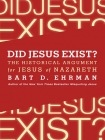Did Jesus Exist? - The Historical Argument for Jesus of Nazareth by Bart Ehrman (ebook reader browser .TXT) 📗

- Author: Bart Ehrman
Book online «Did Jesus Exist? - The Historical Argument for Jesus of Nazareth by Bart Ehrman (ebook reader browser .TXT) 📗». Author Bart Ehrman
The Gospels Contain Nonhistorical Materials
It is true that the Gospels are riddled with other kinds of historical problems and that they relate events that almost certainly did not happen. Think of Luke’s account of Jesus’s birth. Unlike the Gospel of Matthew, Luke indicates that Jesus’s parents lived originally in Nazareth, in the northern part of Galilee (Bethlehem is in the south, near Jerusalem). According to Luke’s story, a tax was imposed on “all the world” by Caesar Augustus, and everyone had to register for a census. Since Joseph’s distant ancestor David was born in Bethlehem, that is where he had to register. While he was there his betrothed, Mary, gave birth.
There is no way this can be historically correct. There was no worldwide (or even empire-wide) census in the days of Augustus, let alone a census in which everyone in the Roman Empire had to register in the town that their ancestors had come from a thousand years earlier, as I explain in another context.6 And certainly no such census could have happened when “Quirinius was the governor of Syria,” as Luke claims, if Jesus was born when Herod was king: Quirinius did not become governor until ten years after Herod’s death.
So too it is completely implausible that when Jesus was put on trial at the end of his life, Pilate offered to release one of his two chief prisoners, Barabbas or Jesus, as was allegedly his custom at Passover (see Mark 15:6–15). We have no historical record of any such custom being carried out by Pilate or anyone else. And it defies imagination that the ruthless Pilate, not known for currying favor among the crowds, would be willing to release a violent and dangerous insurrectionist every year just because the crowds wanted him to do so. This scene, like the census, almost certainly didn’t happen. But that has little bearing on whether Jesus existed. It simply means that this alleged episode did not happen.
Back to our analogies. There are lots of stories about George Washington that may not have happened. Did he really cut down the cherry tree? Did he really have wooden teeth? Did he really stand in the prow of the boat as his troops crossed the Delaware? Did he really get sick after fleeing in his skivvies out the window of his lover’s house when her husband came home, and did he die as a result? Some of these things may have happened (well, not the cherry tree), some of them not. But whether they did or not has little bearing on whether Washington lived. He did live, and we can say some things about him with certainty. So too with Jesus.
Are All the Stories of the Gospels Filled with Legendary Material?
The legendary character of the Gospel accounts of Jesus are stressed by almost all mythicists, but by none with the rigor and passion of Robert Price, whose recent The Christ-Myth Theory and Its Problems echoes, in this respect, many of the themes and restates many of the conclusions that he reached in his earlier work, The Incredible Shrinking Son of Man.7 I will address important aspects of Price’s case against the historical Jesus in the next chapter. For now I want to stress that his emphasis—hammered home page after page—that the Gospel accounts contain legendary material, when seen in a more balanced light, is only marginally relevant to the question of whether Jesus existed.
Price’s argument is sophisticated, and it is a little difficult to explain in lay terms the basic methodological point that forms its backbone. In part it relates to what I mentioned earlier when talking about the form critics, German authors from the beginning of the twentieth century like Martin Dibelius and Rudolf Bultmann. In their view, as we saw, communities shaped the traditions that they passed along about Jesus so that these traditions took specific “forms” depending on the context (the Sitz im Leben—the “situation in life”) in which they were being told. Stories of Jesus’s controversies over the Sabbath took one shape or form, stories of his miracles another form, and so on. One of the implications of this view is that early Christian communities told stories about Jesus only when these stories were relevant to their own communal life situations. Why tell stories that have no relevance? In the logic of Price’s argument, this is the first point: communities tell stories only when they advance their own self-interests in one way or another.
His second point comes from developments in scholarship that happened in the wake of form criticism, especially among the students of Rudolf Bultmann. These students wondered if there was any way to get behind the stories that had been molded and shaped in the early Christian communities, to see if any surviving traditions escaped the Christian storytellers’ influences. Suppose there existed stories about Jesus that show no signs of having been created by the communities that told them, stories, for example, that appear to stand at odds with what the early Christian communities would have wanted to say about Jesus. Traditions dissimilar to what Christians were saying about Jesus would not have been created or formulated by the early Christian storytellers. And so those traditions, if they existed, would involve stories that were told not simply because they were useful in the life situation (Sitz im Leben) of the communities in which they were passed along. Stories like that were probably told simply because they were stories about Jesus that really happened.
This is a standard principle used by scholars today to establish which of the stories in the Gospels almost certainly go back to the historical Jesus as opposed to being made up by later storytellers talking about his life in light of their community’s concerns and needs. The principle is called the “criterion of dissimilarity.” If there is a tradition





Comments (0)